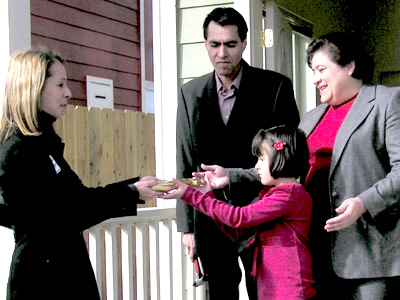
Receiving the keys to your first house is a dream holiday gift. Nine East Bay families began living their dream last Saturday when they received keys to their new homes at a Habitat for Humanity development in East Oakland.
Their new homes, though, were not given to them as a gift. The families each worked at least 500 hours to build their home and their neighbors’ homes in the 54-home development on Edes Ave. They also have a mortgage to pay, though Habitat for Humanity developments represent a larger goal than affordable home ownership: creating real communities.
The process starts with finding families that are dedicated to changing their lives. Habitat for Humanity’s approach is based in the knowledge that people in need are helped the most when they are just as committed and active in changing their lives as the people helping them.
“We look for their willingness to partner with us and put in the work,” says Janice Jensen, Executive Director for Habitat for Humanity East Bay. The requirement for families to work 500 hours on their homes and their neighbors’ homes is key. “It cements their commitment when they are building it,” says Janice. “They get to know their neighbors so by the time the homes are complete, there is a real community there,” she adds.
The Romero family is one of the nine new families now enjoying their new home in the Habitat development. Originally from Mexico, Maria Romero, 47, and her husband and two children were living in an apartment in Oakland's Fruitvale district. They were told about the Habitat program from a neighbor, though they didn’t think they would be approved. The family is now living a dream that for so long they hadn’t dared to dream.
Janice says that the Romero family is a great example of how people become so empowered by building their own home – empowered when they learn so much. The willingness to learn and work is important for the organization’s selection process. “We look for very select families,” says Janice. Beyond the usual income qualifications, they look at a family’s need for housing and conduct interviews. “We want to make sure that we have a family that’s really ready to have a home, ready for the responsibilities of ownership,” says Janice. The organization also looks for a commitment to the community, a desire to be involved with the community and be a positive force. Families also participate in financial literacy, home maintenance and other programs to help them be a successful homeowner.
Habitat for Humanity is known throughout the world for its unique building model, in which volunteers work alongside the families who will own the completed homes. In the East Bay, volunteers include neighbors, corporate groups, church groups, Cal Berkley students and others. Together volunteers, donors, and partner families make this unique building model work. The Habitat family in the East Bay is represented by almost 200 households, 550 Habitat kids and tens of thousands of volunteers.
Beyond the excitement of owning their first home, it’s the bigger life changes that Habitat families focus on. “The home is the catalyst to change their lives and give them stability,” says Janice. Connecting with community, learning new skills and responsibilities, or sending their children to college are the things that transform a family’s life. Speaking to ongoing change for a family, Janice concludes: “We don’t want Habitat kids to become Habitat homeowners in the future – it’s about breaking the cycle.”
For more information, go to: www.habitateb.org.

